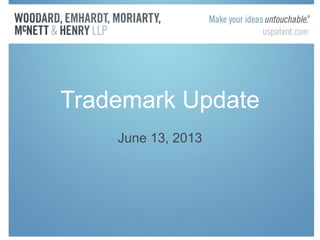
June 2013 Trademark Luncheon
- 1. Trademark Update June 13, 2013
- 2. No Likelihood of Confusion? • TAMAYA is not confusingly similar to MAYA • TTAB found dissimilarity based on: – 3 syllables vs. 2 – Different beginning – first part of mark creates greatest impression – Different look and sound – MAYA is diluted and weak • While TAMAYA has a meaning in a foreign language, the TTAB found the language to be obsolete and obscure and the that consumer is likely to perceive the mark as a coined term
- 3. No Disclaimer for “NATURALLY”? • The PTO refused registration of the mark NATURALLY POWERED for “all-natural coconut- based beverages” because applicant refused to disclaim the word NATURALLY. – The PTO asserted that NATURALLY is merely descriptive of the goods not containing synthetics, chemicals, preservatives, etc. • The TTAB reversed, holding that NATURALLY POWERED is a unitary expression – The multiple elements create an single commercial impression separate and apart from the meaning of the constituent terms – NATURALLY POWERED is a double entendre: the goods are powered by forces of nature/ the goods are powered in a natural manner.
- 4. Facebook Inc. v. Teachbook.com LLC (N.D. Ill 2011) • FACEBOOK sued TEACHBOOK for trademark infringement. TEACHBOOK moved to dismiss for failure to state a claim. Motion was denied. – In Europe, FACEBOOK argued it was distinguishable from FACTBOOK based on the “aural and conceptual differences between the marks” – TEACHBOOK’s website advertised the TEACHBOOK site as an alternative to FACEBOOK’s site as a confidential network not available to students
